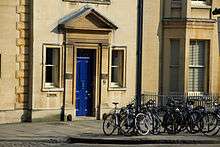Oxford Internet Institute

The Oxford Internet Institute (OII) is a multi-disciplinary department, part of the University of Oxford, England. It is housed over two sites on St Giles in Oxford, including a primary site at 1 St Giles, owned by Balliol College. The department undertakes research and teaching devoted to understanding life online, with the aim of shaping Internet research, policy, and practice.
Founded in 2001, the OII has tracked the Internet's development and use, aiming to shed light on individual, collective and institutional behaviour online. The department brings together academics from a wide range of disciplines including political science, sociology, geography, economics, philosophy and physics and employs a diverse array of methods and data sources to study digital life.
Professor William H. Dutton served as Director of the OII from 2001 to 2011. Professor Helen Margetts has served as Director since 2011.[1]
Research
Research at the OII covers a huge variety of topics, with faculty publishing journal articles and books on issues including privacy and security, e-government and e-democracy, virtual economies, smart cities, digital exclusion, digital humanities, online gaming, big data and Internet geography. The OII currently has the following research clusters reflecting the diverse expertise of faculty:
- Digital Politics and Government
- Information Governance and Security
- Social Data Science
- Connectivity, Inclusion and Inequality
- Internet Economies
- Digital Knowledge and Culture
- Education, Digital Life and Wellbeing
- Ethics and Philosophy of Information
Studies of Wikipedia
OII has published several studies in Internet geography and Wikipedia. In November 2011, the Guardian Data Blog published maps of geotagged Wikipedia articles written in English, Arabic, Egyptian Arabic, French, Hebrew and Persian.[2] OII Senior Research Fellow Mark Graham[3] led the study and published the results on his blog, Zero Geography.[4] Graham also leads an OII project focused on how new users are perceived, represented, and incorporated into the Wikipedia community.[5] In 2013, OII researchers published a study of controversial topics in 10 different language versions of Wikipedia, using data related to "edit wars".[6]
Teaching
Since 2006, the OII has offered a DPhil (doctoral) degree in "Information, Communication, and the Social Sciences."[7] Since 2009, it has offered a one-year Master of Science (MSc) degree in "Social Science of the Internet".[8] From 2015, prospective students can apply to study the MSc degree part-time over two years.[9] In addition, the department also runs an annual Summer Doctoral Programme which brings outstanding PhD students to study at the OII for two weeks each July.[10]
History
The Oxford Internet Institute was made possible by a major donation from The Shirley Foundation of over £10m, with public funding totalling over £5m from the Higher Education Funding Council for England.
The idea originated with Derek Wyatt MP, was quickly espoused by Colin Lucas, Vice-Chancellor of Oxford University, and Andrew Graham, then Master-Elect of Balliol. Two Balliol Fellows, who knew Dame Stephanie from The Worshipful Company of Information Technologists, approached Dame Stephanie for support.
OII awards
For its 10th anniversary the OII launched the OII awards for lifetime achievement awards on the internet research field and the Internet & Society awards for significant recent contribution to develop the internet for public good.[11]
Lifetime achievement awards winners
2014:
- Sir Tim Berners-Lee
- Dame Steve Shirley
- Barry Wellman
2013:
2012:
- Professor Yochai Benkler
2011:
- Professor Manuel Castells
- Dr Vinton G. Cerf
- Dr David Clark
- Professor William H. Dutton
- Professor Dame Wendy Hall
- Mr. Joi Ito
- Mr. Niklas Zennström
Internet and society awards
2014:
2013:
2012:
2011:
See also
References
- ↑ "Professor Helen Margetts Appointed Director of the Oxford Internet Institute". Retrieved 7 Nov 2011.
- ↑ Rogers, Simon (11 November 2011). "The world of Wikipedia's languages mapped". The Guardian.
- ↑ "Dr. Mark Graham". Retrieved 14 June 2013.
- ↑ Mark Graham (10 November 2011). "Mapping Wikipedia's augmentations of our planet". Retrieved 2014-09-04.
- ↑ "Wikipedia's Networks and Geographies: Representation and Power in Peer-Produced Content". Oxford Internet Institute. November 2010. Retrieved 2014-09-04.
- ↑ Taha Yasseri, Anselm Spoerri, Mark Graham, János Kertész (8 Jul 2013). "The most controversial topics in Wikipedia: A multilingual and geographical analysis". arXiv:1305.5566v2
 .
. - ↑ "Oxford Internet Institute's D. Phil programme". Retrieved 29 April 2011.
- ↑ "Oxford Internet Institute's one year MSc". Retrieved 29 April 2011.
- ↑ "The OII's MSc in Social Science of the Internet is now available for part-time study | Oxford Internet Institute". www.oii.ox.ac.uk. Retrieved 2016-01-15.
- ↑ "The OII Summer Doctoral Programme". The OII Summer Doctoral Programme. Retrieved 2016-01-15.
- ↑ OII Awards | OII Awards. Blogs.oii.ox.ac.uk (2013-07-18). Retrieved on 2014-04-12.
External links
Coordinates: 51°45′28″N 1°15′34″W / 51.7578°N 1.2595°W
